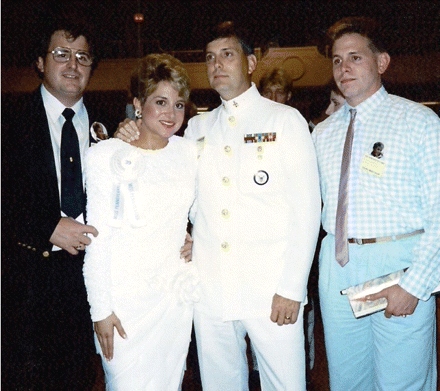Michelle Buonfiglio was diagnosed with glomerulonephritis at age 12. She had no family history of kidney disease, and her doctors thought her condition might have been related to infections she'd had as a younger child. Ten years later, Michelle was transplanted with a kidney from her older brother and went on to become Miss Pennsylvania and travel the country advocating for organ donation. Now a 45-year-old successful writer and mother of two, she shared her transplant story with Psychiatric News:
When I was diagnosed with glomerulonephritis at the age of 12,... I understood the concept of a transplant, but I was almost embarrassed to talk about it. It felt like I was only trying to get attention, and 34 years ago, most people were pretty uncomfortable talking about transplantation.
My doctor recommended me for transplantation when I still had 30 percent function. He knew I had three brothers and a mother willing to donate and felt it made good sense to take advantage of my good fortune. Because of this, I never had to go through the physiological and psychological trauma of dialysis. I realize that was an extraordinary gift, in addition to the organ itself. I often feel guilty when talking with other kidney transplant candidates or recipients about never having needed dialysis.
I always knew I'd be transplanted—and that the donation would come from my family—but I never really looked past the "end point" of the transplantation. In my mind—and I can still envision it—I saw the future as a dark, square wall with nothing beyond it. So I talked about going to college, but never saw myself graduating. I never thought about marriage. I talked about adopting children, but never saw myself taking care of a family. It's not that I didn't imagine living; I just didn't really prepare to fully live. So when it came time for my brother to give me one of his kidneys, I resented him for "forcing" upon me a gift I couldn't repay, as well as forcing me to face the maturational challenges of living beyond the transplantation.
It was my oldest brother—15 years older—who was my donor. He'd joined the Navy when I was 3, and although I adored him, I wasn't close to him.
I was stoic going into surgery, but after years of fighting kidney disease and the knowledge that my kidneys would eventually fail me, I was finally falling apart emotionally.
I remember the whole situation being thick with tension and anger. At that time, I didn't understand how greatly my illness had affected my mental health, and obviously I was storing up anger at my helplessness and at the toll my illness had taken on my family.
The kidney started working immediately after surgery, and I felt amazingly better. And I experienced the meaning of the phrase "I didn't know how sick I was until I wasn't sick anymore." No more hypertension, edema, uremia; the "veil" of fatigue was gone. But not all went smoothly: the surgery— though pretty simple—is still traumatic. I suffered a slight rejection, from which I recovered, but then I contracted cytomegalovirus for six weeks. I was very depressed, spending most of my time in bed with a series of high-grade fevers. When I finally recovered, I lost my hair, and then I began to gain weight from finally being able to eat all the foods forbidden to a renal-disease patient.
When I was very depressed, I sometimes went a few days without my medications if I ran out of them, either because I just couldn't drag myself out of the house to the pharmacy or was very disorganized.
Eventually, I got help, and I learned to love and protect my donated kidney. But in talking to other organ-transplant recipients, I would say there definitely appears to be a posttraumatic stress disorder–like syndrome among us. Many, many of us talk about "survivors' guilt," or feeling like soldiers who've been through war and know others weren't so lucky. The surgery experience itself—including the placement of someone else's body part inside you, especially that of a cadaveric donor—is traumatic. Most recipients feel deeply the tragedy that took place or the sacrifice that has been made so that a new organ can be harvested and donated and give us new life.

